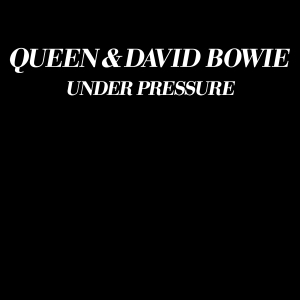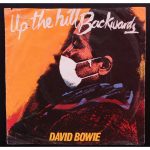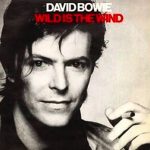“Under Pressure” was included on Queen’s 1982 album Hot Space. The song reached number one on the UK Singles Chart, becoming the group’s second number-one hit in their home country (after 1975’s “Bohemian Rhapsody”, which topped the chart for nine weeks), and Bowie’s third UK number-one. The song only peaked at No. 29 on the US Billboard Hot 100, and would re-chart for one week at No. 45 in the US following Bowie’s death in January 2016. It was also number 31 on VH1’s 100 Greatest Songs of the ’80s.
The song was played live at every Queen concert from 1981 until the end of Queen’s touring career in 1986. It is recorded on the live albums Queen Rock Montreal and Live at Wembley ’86. The song was included on some editions of Queen’s first Greatest Hits compilations, such as the original 1981 Elektra release in the US. It is included on the band’s compilation albums Greatest Hits II, Classic Queen, and Absolute Greatest as well as Bowie compilations such as Best of Bowie (2002), The Platinum Collection (2005) and Nothing Has Changed (2014).
Creation
Queen had been working on a song called “Feel Like”, but was not yet satisfied with the result. David Bowie had originally come to Mountain Studios to sing back up vocals on another Queen song, “Cool Cat”, but his vocals were removed from the final song because he was not satisfied with his performance. Once he got there, they worked together for a while and wrote the song. The final version, which became “Under Pressure”, evolved from a jam session that Bowie had with the band at Queen’s studio in Montreux, Switzerland. It was credited as being co-written by the five musicians. The scat singing that dominates much of the song is evidence of the jam-beginnings as improvisation. However, according to Queen bassist John Deacon (as quoted in a French magazine in 1984), the song’s primary musical songwriter was Freddie Mercury – though all contributed to the arrangement. Brian May recalled to Mojo magazine, in October 2008, that, “It was hard, because you had four very precocious boys and David, who was precocious enough for all of us. David took over the song lyrically. Looking back, it’s a great song but it should have been mixed differently. Freddie and David had a fierce battle over that. It’s a significant song because of David and its lyrical content.” The earlier, embryonic version of the song without Bowie, “Feel Like”, is widely available in bootleg form, and was written by Queen drummer Roger Taylor.
There has been some confusion about who created the song’s bassline. John Deacon said (in Japanese magazine Musiclife in 1982, and in the previously mentioned French magazine) that David Bowie created it. In more recent interviews, Brian May and Roger Taylor credited the bass riff to Deacon. Bowie, on his website, said that the bassline was already written before he became involved. Roger Taylor, in an interview for the BBC documentary Queen: the Days of Our Lives, stated that Deacon did indeed create the bassline, stating that all through the sessions in the studio he had been playing the riff over and over. He also claims that when the band returned from dinner, Deacon, amusingly, forgot the riff, but fortunately Taylor was still able to remember it. However, Brian May contradicted this account in a 2016 Mirror Online article, writing that it was actually Bowie, not Taylor, who had inadvertently changed the riff. The riff began as “Deacy began playing, 6 notes the same, then one note a fourth down”. After the dinner break, Bowie corrected (actually changed) Deacon’s memory of the riff to “Ding-Ding-Ding Diddle Ing-Ding”.
Music video
The video for the song features neither Queen nor David Bowie due to touring commitments. Taking the theme of pressure, director David Mallet edited together stock footage of traffic jams, commuter trains packed with passengers, explosions, riots, cars being crushed and various pieces of footage from silent films of the 1920s, most notably Sergei Eisenstein’s influential Soviet film Battleship Potemkin, the silent Dr. Jekyll and Mr. Hyde starring John Barrymore, and F.W. Murnau’s Nosferatu, a masterpiece of the German Expressionist movement. The video explores the pressure-cooker mentality of a culture willing to wage war against political machines, and at the same time love and have fun (there is also footage of crowds enjoying concerts, and lots of black and white kissing scenes).
Track listing
1981 single
“Under Pressure” (Mercury, May, Taylor, Deacon, Bowie) – 4:08
“Soul Brother” (Mercury, May, Taylor, Deacon) – 3:38
EMI released a 3-inch CD version of the single in 1988 with “Body Language” as an additional B-side.
Personnel
Original producers:
Queen
David Bowie
Musicians on original version:
Freddie Mercury – lead and backing vocals, piano, Hammond organ, handclaps, finger snaps
Brian May – electric guitar, handclaps, finger snaps
Roger Taylor – drums, backing vocals, handclaps, finger snaps
John Deacon – bass guitar, handclaps, finger snaps
David Bowie – lead and backing vocals, synthesizer, handclaps, finger snaps
Reception
The September 2005 edition of online music magazine Stylus singled out the bassline as the best in popular music history. In November 2004, Stylus music critic Anthony Miccio commented that “Under Pressure” “is the best song of all time” and described it as Queen’s “opus”. In 2012, Slant Magazine listed “Under Pressure” as the 21st best single of the 1980s.
Live performances
Although very much a joint project, only Queen incorporated the song into their live shows at the time. Bowie chose not to perform the song before an audience until the 1992 Freddie Mercury Tribute Concert, when he and Annie Lennox sang it as a duet (backed by the surviving Queen members). However, after Mercury’s death and the Outside tour in 1995, Bowie performed the song at virtually every one of his live shows, with bassist Gail Ann Dorsey taking Mercury’s vocal part. The song also appeared in setlists from A Reality Tour mounted by Bowie in 2004, when he frequently would dedicate it to Freddie Mercury. Queen + Paul Rodgers have recently performed the song; and in summer of 2012, Queen + Adam Lambert toured, including a performance of the song by Lambert and Roger Taylor in each show. While David Bowie was never present for a live performance of the song with Freddie Mercury, Roger Taylor instead filled for backing vocals usually in unison with Mercury, as Mercury took over all of Bowie’s parts.
Live recordings
Queen first recorded a live version of the song at The Montreal Forum in Canada on 24 November 1981. This was included in the concert films We Will Rock You and Queen Rock Montreal. Incidentally it is one of the few times in concert where Mercury used falsetto in the song on the line “these are the days it never rains but it pours”.
A second live version of the song was recorded at Milton Keynes, England, in 1982. This was released in 2004 on the live album/DVD Queen on Fire – Live at the Bowl. Prior to the concert, rumours circulated that Bowie would appear with Queen to sing his parts onstage, but it is probable that he did not even attend the concert.
Later, Queen recorded a third live version of the song at Wembley Stadium, London, in 1986. This was released on the live album/DVD Live at Wembley Stadium. Another rendition from this same tour (from Queen’s concert in Budapest) appeared in edited form on the album Live Magic in 1986. A recording taken from Queen’s last gig in Knebworth Park in 1986, appears, albeit in remixed form, as a B-side from second CD single of “Rah Mix” version of this song, released in 1999. (See below)
During the Freddie Mercury Tribute Concert in 1992, the surviving members of Queen along with Bowie and Annie Lennox (filling in for Mercury) performed the song. The concert was later released on DVD in 2002 for the 10th anniversary.
A version recorded by David Bowie’s live band in 1995 was released on the bonus disc included with some versions of Outside – Version 2. This live version was also released on the single “Hallo Spaceboy” in 1996.
Bowie’s DVD A Reality Tour (2004) and album A Reality Tour (2010) include a November 2003 live version from the A Reality Tour, recorded in Dublin, with Bowie’s bassist Gail Ann Dorsey singing Mercury’s parts.
The 2006 VH1 Rock Honors at the Mandalay Bay Events Center in Las Vegas, featured Queen + Paul Rodgers performing “Under Pressure” along with “The Show Must Go On”, “We Will Rock You” and “We Are The Champions” as a live broadcast.
Remixes and other releases
Rah Mix
A remixed version (called the “Rah Mix”) was issued in December 1999 to promote Queen’s Greatest Hits III compilation, reaching No. 14 on the UK Singles Chart. The video for the Rah Mix was directed by DoRo and features footage of Freddie Mercury from the Wembley concert on 12 July 1986 and David Bowie at the Freddie Mercury Tribute Concert also at Wembley on 20 April 1992 spliced together using digital technology (and with Annie Lennox carefully edited out) and features on the Greatest Flix III compilation, the Rah Mix CD single (as an Enhanced CD video) and the 2011 iTunes LP edition of Hot Space.
Track listing
Two CD singles (one multimedia enhanced) released 6 December 1999 and 7″ picture disc released 13 December 1999. As “Bohemian Rhapsody” wins The Song of The Millennium award, this released as B-side under the title “The Song of The Millenium – Bohemian Rhapsody”.
CDS No. 1
Under Pressure (Rah Mix)
The Song of the Millennium – Bohemian Rhapsody
Thank God It’s Christmas
CDS No. 2
Under Pressure (Rah Mix – Radio Edit)
Under Pressure (Mike Spencer Mix)
Under Pressure (Knebworth Mix)
Enhanced section
7″
Under Pressure (Rah Mix)
The Song of the Millennium – Bohemian Rhapsody
Was initially released in US on the Elektra Records US and Canadian versions of Queen’s Greatest Hits as a new track.
Was released in UK on Queen’s (1991) Greatest Hits II (which would later be included in The Platinum Collection (2000, 2002 and 2011) removing the second time David Bowie sings, “This is our last dance.”
The song was released as a bonus track on the Virgin Records reissue of Bowie’s Let’s Dance in 1995.
Hollywood Records remixed the song for their 1992 release, Classic Queen. This version features improved sound quality, but removes Mercury’s interjection “that’s okay!” at about 0:53.
It also appeared on the Bowie compilation Bowie: The Singles 1969-1993 (1993).
The original single version appears on disc three of Bowie’s The Platinum Collection (2005). This disc was later released separately as The Best of David Bowie 1980/1987 (2007).
An instrumental version appears in the DVD menu for the Hot Space section of Greatest Video Hits 2.
Has also been performed, but without the lyrics, by the Royal Philharmonic Orchestra.
Was featured nearly in its entirety in the 2010 film It’s Kind of a Funny Story, initially as a ‘cover’ by the patients in a music therapy class at a New York City psychiatric ward, which the film transformed into the authentic song ‘performed’ by the patients, dressed in glam, in a near music-video style imaginary sequence (with David Bowie and Queen’s original vocals and instrumentation).
The song appears on Nothing Has Changed (2014).
Other remixes
Mr. Mixx Remix. Mr. Mixx of 2 Live Crew produced a hip-hop remix intended for inclusion as the fourth track on the cancelled 1992 Hollywood Records compilation BASIC Queen Bootlegs.
Lazy Kiss Edit. Released in October 2013 by Brazilian Electro-House duo, Lazy Kiss. This edit/mashup gained exposure through blog filter site, HypeMachine and the Italian music blog, Frequenze Indipendenti.



